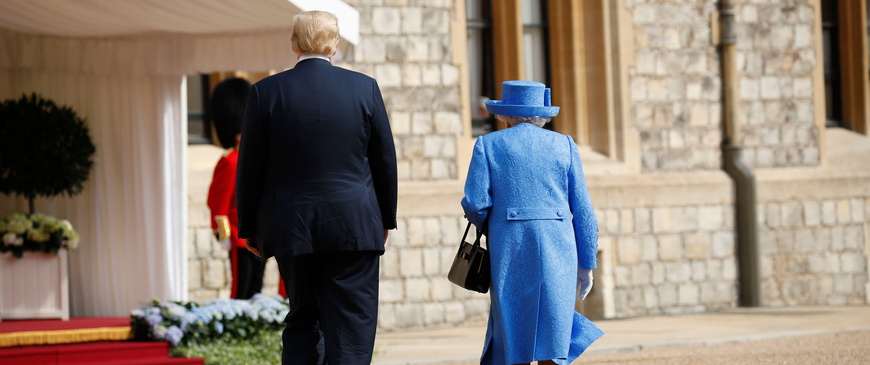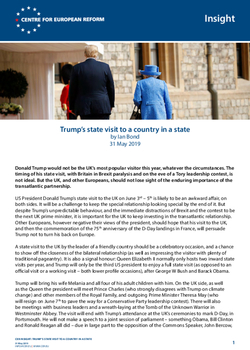
Trump's state visit to a country in a state
Donald Trump would not be the UK’s most popular visitor this year, whatever the circumstances. The timing of his state visit, with Britain in Brexit paralysis and on the eve of a Tory leadership contest, is not ideal. But the UK, and other Europeans, should not lose sight of the enduring importance of the transatlantic partnership.
US President Donald Trump’s state visit to the UK on June 3rd-5th is likely to be an awkward affair, on both sides. It will be a challenge to keep the special relationship looking special by the end of it. But despite Trump’s unpredictable behaviour, and the immediate distractions of Brexit and the contest to be the next UK prime minister, it is important for the UK to keep investing in the transatlantic relationship. Other Europeans, however negative their views of the president, should hope that his visit to the UK, and then the commemoration of the 75th anniversary of the D-Day landings in France, will persuade Trump not to turn his back on Europe.
Despite #Trump’s unpredictable behaviour and the distractions of #Brexit, it is important for the UK to keep investing in the transatlantic relationship.
A state visit to the UK by the leader of a friendly country should be a celebratory occasion, and a chance to show off the closeness of the bilateral relationship (as well as impressing the visitor with plenty of traditional pageantry). It is also a signal honour: Queen Elizabeth II normally only hosts two inward state visits per year, and Trump will only be the third US president to enjoy a full state visit (as opposed to an official visit or a working visit – both lower profile occasions), after George W Bush and Barack Obama.
Trump will bring his wife Melania and all four of his adult children with him. On the UK side, as well as the Queen the president will meet Prince Charles (who strongly disagrees with Trump on climate change) and other members of the Royal Family, and outgoing Prime Minister Theresa May (who will resign on June 7th to pave the way for a Conservative Party leadership contest). There will also be meetings with business leaders and a wreath-laying at the Tomb of the Unknown Warrior in Westminster Abbey. The visit will end with Trump’s attendance at the UK’s ceremonies to mark D-Day, in Portsmouth. He will not make a speech to a joint session of parliament – something Obama, Bill Clinton and Ronald Reagan all did – due in large part to the opposition of the Commons Speaker, John Bercow, who, together with Labour leader Jeremy Corbyn and Liberal Democrat leader Vince Cable, will boycott the state banquet held by the Queen in Trump’s honour.
When May extended the invitation to Trump on her visit to Washington on January 27th 2017, a week after his inauguration, she hoped to get Trump on her side on Brexit and a future UK-US trade deal, but she was taking a big risk. Trump is among the most polarising US presidents of modern times and a controversial figure in the UK, thanks to his brash and erratic behaviour, his migration policy and his links to arch-Brexiter Nigel Farage and other European right-wing populists. The gamble has not paid off: when Trump paid a brief working visit to the UK in 2018, he attacked May’s Brexit deal, which he said would “probably kill” a free trade agreement with the US; and said that Boris Johnson, now the favourite to be May’s successor, would make a “great prime minister” (it is unclear whether Trump plans to meet Johnson, or any of the other possible successors to May).
The 2018 visit was marked by public protests. More are expected for the state visit. Trump’s is also not the only controversial state visit the Queen has hosted – among the more questionable guests have been dictators like Nicolae Ceauşescu, Romania’s communist president, and Robert Mugabe, president of Zimbabwe. Trump may be on his best behavior for the Queen. After tea with her during his 2018 visit, he was quoted as saying, “The Queen is fantastic! … To have a Queen like that is great."
The state visit has been delayed for almost as long as possible (a visit in 2020, when Trump will presumably be concentrating on his re-election campaign, would have been very unlikely). But any hope that Trump could come and bless a post-Brexit Britain with a generous UK-US free trade deal was long ago dispelled. The UK is still lurching around, seeking a way out of the Brexit swamp; it may leave the EU, with or without a deal, on October 31st, but it may not. If the UK does not leave, then there will certainly be no trade deal. If it leaves on the basis of the withdrawal agreement and political declaration negotiated by May, then it could start negotiating a trade agreement with the US. But the scope of the transatlantic trade deal would be limited by EU rules in some areas, especially agriculture, as Sam Lowe set out in a recent CER bulletin article. If the UK leaves the EU with no deal, the US will be in a stronger position to pursue its own far-reaching objectives for trade negotiations – which offer the UK no special favours. Trump will no doubt use the state visit to press the UK for bankable concessions, even before formal negotiations start. But it is hard to see how May could commit any of her possible successors to anything specific; at most she and Trump could set the tone for future talks.
Traditionally, the UK would use a visit by a US president to reinforce the important defence and security relationship which makes the special relationship special.
Traditionally, the UK would use a state visit by a US president to reinforce the important bilateral defence and security ties that make the special relationship special. But there are tensions in this area too, over two issues in particular.
The first is the possibility of the Chinese firm Huawei providing equipment for the UK’s planned 5G communications network. It is not yet clear what UK policy on this will be. A leak from the UK’s National Security Council, which led May to fire Defence Secretary Gavin Williamson, suggested that the UK was willing to let Huawei supply equipment regarded as ‘non-core’, such as antennae. The US has so far taken a very firm line with its allies: Robert Strayer, Deputy Assistant Secretary of State for Cyber, international Communications and Information Policy, said in London on April 29th that if countries allowed Huawei and other “untrustworthy vendors” into any part of the 5G network “we will have to reassess the ability for us to share information and be connected with them in the ways that we are today”. Secretary of State Mike Pompeo, delivering the Margaret Thatcher lecture in London on May 8th, reinforced the message: “What can her majesty’s government do to make sure sensitive technologies don’t become open doors for Beijing’s spymasters?... Insufficient security will impede the United States’ ability to share certain information with trusted networks”. There is a clear implication that if the UK allows Huawei to provide any 5G infrastructure, then the US will cut off some or all intelligence co-operation.
Under any other administration, such a threat would seem incredible. But it cannot entirely be dismissed, because of the second cause of tension: Trump’s apparent belief that British intelligence was involved in a plot against his election. In March 2017, Trump’s then-press secretary, Sean Spicer, gave credence to a conspiracy theorist’s story that the UK’s signals intelligence agency, GCHQ, had spied on Trump. Trump revived the story in April 2019 in a tweet, adding “WOW! It is now just a question of time before the truth comes out, and when it does, it will be a beauty!”. Though GCHQ has issued highly unusual on-the-record denials, describing the allegations as “nonsense… utterly ridiculous and should be ignored”, the idea that British intelligence has attacked him is clearly lodged in Trump’s mind. That might make him more receptive to the argument that a country that also gave the Chinese government an opportunity to spy on the US was no longer a worthy intelligence ally.
Despite all the irritants in the relationship, and all the risks of Trump saying something inflammatory, however, the British government must not lose sight of the continuing importance of the transatlantic partnership. Trump’s presidency will not last forever, so the UK has a strong interest in ensuring that its relationship with the US survives, albeit battered, until the next (and hopefully more Atlanticist) president takes office. Whether Brexit ultimately happens or not, the US is likely to remain the UK’s biggest trade and investment partner outside Europe. And it will remain vital to the UK’s defence and security.
The British government needs to look beyond Trump and his immediate circle to bolster American support for the UK and for Europe more generally. It might be tempting to offer the president some version of Poland’s mooted ‘Fort Trump’ – a military base or some other eye-catching facility designed to cement the bilateral relationship. But the reality is that the UK’s defence and security will also depend on NATO’s continued effectiveness; that in turn will depend on two linked things: increased European defence capabilities (based on increased budgets); and sustained US popular support for defending Europe.
Inside or outside the EU, the UK will remain a major defence player in Europe, and one of the few NATO allies to meet the target of spending two per cent of GDP on defence. That gives it some moral basis to press others (including but not limited to Germany) to step up their investment in defence, to meet threats from Russia and elsewhere. One message of the D-Day commemoration is that peace in Europe does not maintain itself – it takes effort. If France and Germany want to talk about ‘strategic autonomy’ for Europe, there is no need for the UK or the US to worry about that; the key thing is that EU leaders can “prove that EU defence initiatives will create a stronger partner for the US”, as Sophia Besch wrote in March.
But the UK could also lead an effort by NATO’s European members to reach out to ordinary Americans, with public diplomacy efforts outside the traditional centres of foreign policy thinking in the US. The latest public opinion survey by the Chicago Council on Global Affairs shows that while 61 per cent of those identifying as Democrats would send US forces to defend the Baltic States if they were attacked by Russia, only 52 per cent of Republicans would do the same – presumably reflecting Trump’s frequent criticism of his European allies’ inadequate defence spending (even though the Baltic States are among the top performers). Europeans have taken it for granted that Americans would always support NATO, and in the abstract the vast majority of them still do. But fewer Americans have family ties to Europe now than during the Cold War; and many fewer US service personnel have experience of living in Europe and befriending Europeans. Their backing for NATO is not guaranteed.
For the UK, seemingly in the midst of a long-running attack of existential angst, Trump’s visit may look like a distraction from the real business of political blood-letting over Brexit. But it is also an opportunity to refocus on bigger issues of European security, and to remind Americans, Britons and other Europeans that, even in the Trump era, transatlantic partnership remains vital.
Ian Bond is director of foreign policy at the Centre for European Reform.


Add new comment